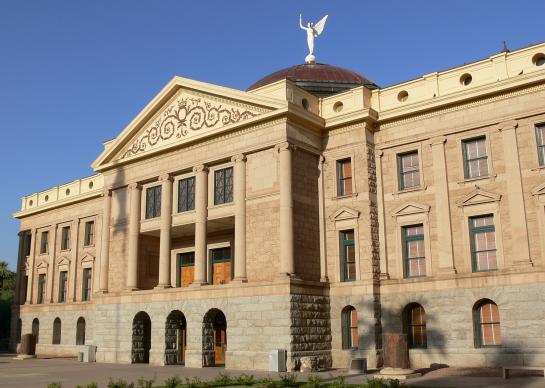AZ Legislative Update 02-25-2022

Staff and legislators at the Arizona Legislature call this “Crossover Week,” the point at which the House and Senate rush to vote on bills so they can move to committee hearings in the second legislative chamber. Crossover Week always includes long days of floor debates and votes and a rushed, unpredictable approach to bills. Last-minute amendments can pass before they’re even available for review to Capitol observers, and tempers run hot as lawmakers try to process hundreds of votes in just a few days.
The Senate started this hectic week on a bipartisan note, voting to raise the spending cap on school districts and avert a $1.2 billion cut to school budgets. Despite Republican concerns that delayed a vote on the proposal last week, the Senate obtained 23 votes – more than the supermajority required. All Senate Democrats and a majority of Senate Republicans supported the resolution; six Republicans voted against it because they want to shift the discussion about how the legislature funds schools. The measure does not require the
Governor’s signature, so the Senate vote provided immediate answers for Arizona schools that have been warily watching for legislative action.
The debate on Arizona’s constitutional cap on school spending is fierce and far from over, though. School budgets will be in the same situation next year; while leaders in both political parties believe it’s time to ask voters to revisit the cap, they disagree about whether it should be removed entirely or just changed to reflect current school expenses.
There was plenty of debate on other policy issues this week, as well. House members advanced controversial proposals to change math requirements for high school graduation, make it harder to pass a citizens’ initiative, increase parents’ ability to push for penalties if they think a teacher violated their rights, and ask voters to remove cities’ ability to set a different minimum wage than the state’s.
The Senate voted to appropriate $700 million to build a border wall, create a tax credit for filmmakers and a tax break for gun purchases, make it a crime for an employer not to provide a religious exemption to a COVID-19 vaccine mandate, ban government mask mandates, and assert that the state legislature has authority over elections.
Lawmakers failed to pass bills to allow more individuals to get concealed weapons permits, criminalize the distribution of some medications used for abortions, and override local labor laws.
Appropriations Committees agreed to ban mail-in ballots, limit when someone can videotape a police officer, specify what paper must be used for ballots, and increase security for early ballot drop boxes.
Lawmakers did find bipartisan agreement on some things, however – including bills to create a state earned income tax credit, invest in training programs for health care professionals, improve the Arizona Trail, allow someone who is wrongfully arrested to clear their record, increase stipends for kinship care, and tighten regulation of massage therapists.
What’s Next?
Policy committees will resume their meetings in the House and Senate next week to consider bills that have already passed the first legislative chamber. There are more than 600 bills still advancing this year – most at a very rapid pace as legislators rush to get their priority legislation to the Governor’s desk.
Budget Update: Arizonans Are Still Spending
There’s no sign of productive budget talks at the legislature yet this year, but the latest tax revenues gave lawmakers even more to spend. According to a recent report from the Joint Legislative Budget Committee, the state’s General Fund took in $1.58 billion during the month of January – 22.2% higher than last January and $113 million more than state economists expected.
The increases continue to be driven by Arizonans’ spending habits. Sales taxes accounted for $682.3 million of the tax revenues last month, and this was the eleventh month in a row that sales taxes have grown by double digits compared to last year. Taxes on hotel stays and amusements – like concert and movie tickets – are 168% higher than last year. The rebound extends to restaurants and bars, as well. Sales taxes from those facilities rose almost 41% last month and are up 35% compared to last year. And Arizonans are still shopping: Retail sales online and in person climbed 16.1% last month.
Individual income taxes went up, too, and corporate income taxes are up 52.6% so far this fiscal year, though they dropped slightly this month.
When adjusted for tax filing changes during the pandemic, the state’s General Fund balance is 19.1% higher than it was last year.
In the Elections
House Speaker Rusty Bowers (R-Mesa) is running for the Arizona Senate, and he has thoughts about Arizona politics and the Senate’s ballot recount. Senate President Karen Fann (R-Prescott) and Maricopa County still see things differently. So do Republican officials who supported the recount.
In the Courts
Arizona’s Attorney General asked the U.S. Supreme Court to change how the state determines immigration status. The Secretary of State and Attorney General asked a court to settle their disagreements about laws governing the state’s site for online candidate signatures.
In the News
Arizona is mourning the loss of former Senator David Bradley (D-Tucson). The federal government is directing $1.7 billion to tribal water rights settlements. Former Governor Bruce Babbitt thinks Arizona should regulate groundwater in rural Arizona. Senator Tyler Pace (R-Mesa) wants to expand postpartum medical care. Outside the noisy political debate, more states are implementing technology for vaccine records. Public health officials are studying the needs of Colorado City residents. The state is investing $68.1 million for broadband infrastructure along I-40.
On the Bright Side…
Sonya found a way to help.